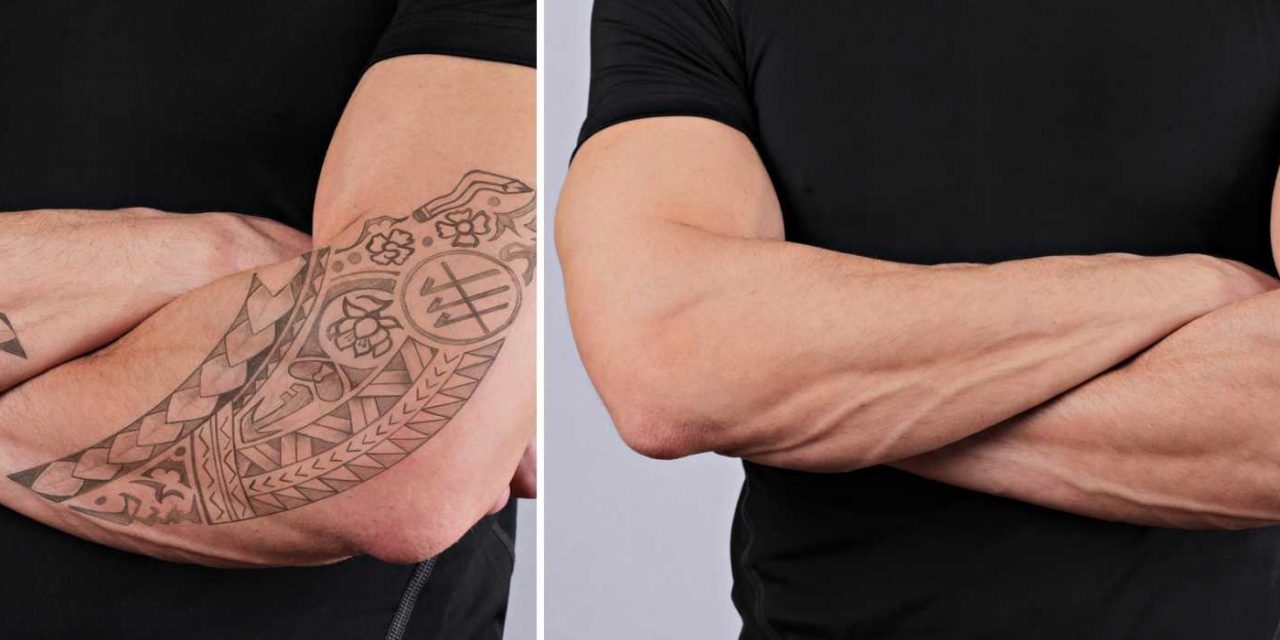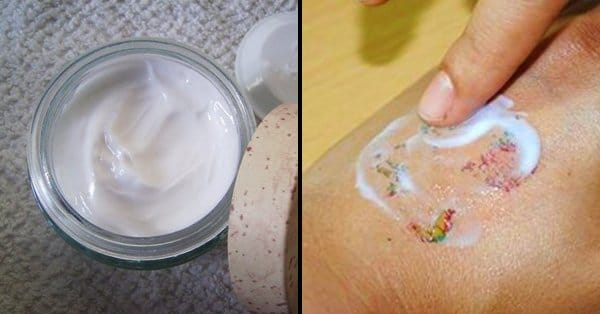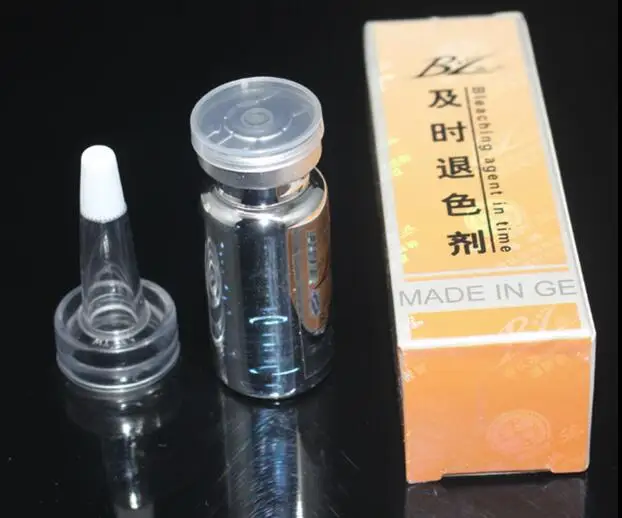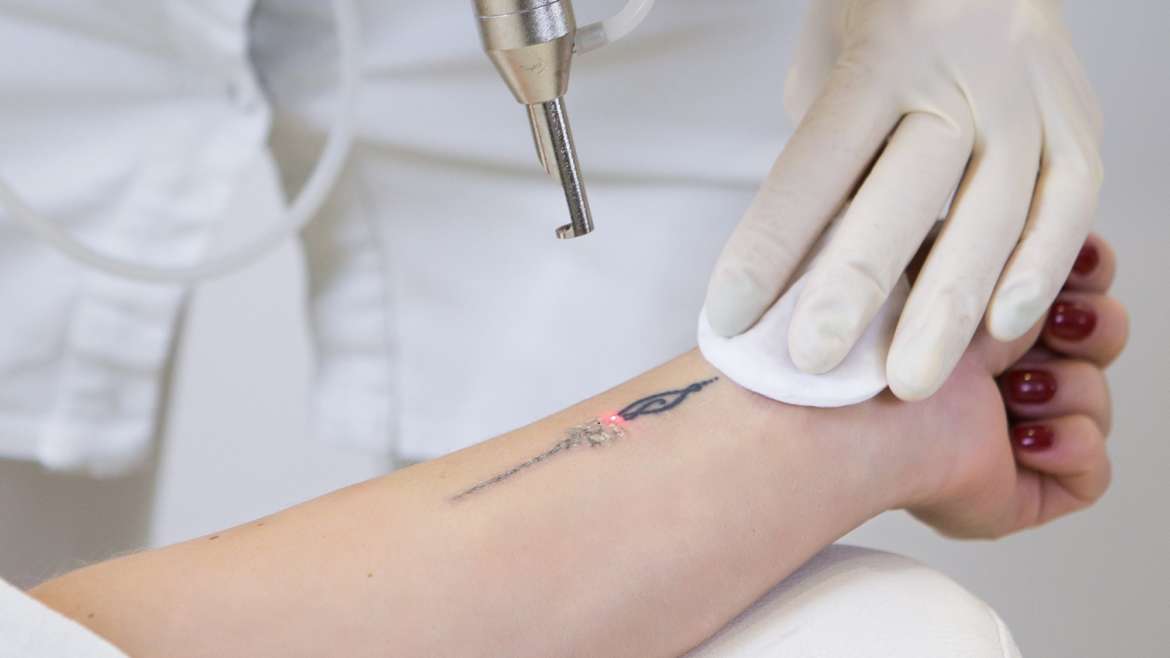Lastly, the chemical peel; the premise of this treatment being to exfoliate the upper layers of dead skin to improve texture and luminosity. When it comes to removing ink, the process is slightly more hardcore, using Trichloroacetic acid to remove the outer layers of skin, including the inked portion. It's a hugely painful and unsafe way of removing a tattoo, and can cause blistering, scarring, or severe discolouration of the area. It's not recommended for those with darker skin tones, as the lightening effects are unpredictable. TCA can even now be bought in pharmacies or online, although it is highly recommended not to try this at home and instead seek a tattoo removal professional first.
TCA also isn't that reliable; over time (between 3-6 treatments, each with 4-6 week intervals in-between), it can gradually lighten a tattoo, but rarely removes it completely. Since laser tattoo removal is expensive, and can be painful, many people turn to at home tattoo removal treatments to fade away their unwanted ink. These DIY Tattoo remover creams are cost effective, and work to slowly fade the tattoo ink until you can't see it anymore. We have reviewed the best tattoo remover creams that will work to eliminate your old tattoos and leave your skin looking healthy.
There used to be light tattoos and amateur tattoos back in the day, but today tattoos are really dense. Tattoo removal is a serious decision that should not be taken on the spur of the moment, as it will require a significant amount of time and dedication to achieve complete removal of the tattoo. A significant improvement with Picosure is that it has allowed us to erase green tattoos that were previously impossible to remove.
It is becoming increasingly clear that tattooists' techniques have vastly improved over the course of the years. The majority of the sailors we dealt with back in the 1990s had faded tattoos that were relatively easy to erase in less than ten sessions when we first started. Tattoos are becoming increasingly dense, to the point where they almost appear to be black enamel paint on the skin. Because there is so much pigment in there, it can take a very long time to completely remove it off the skin. The notion that scheduling tattoo removal treatments closer together can speed up the removal process is false, since you are only prolonging the removal process. Ideally, you treat, wait for the body to remove as much as it possibly can, and then come back again, which means roughly three monthly intervals over a period of several months or years.
The majority of tattoos are black and thick, with the exception of some lighter colours such as white and grey that move more quickly. Laser is the only device that can shatter those ink particles into smaller molecules so they are easier and faster to be flushed out by our immune cells. The laser initiates the removal of ink particles and your body does the rest. Tattoos closer to the lymph nodes are removed quicker from the body as opposed to tattoos on the extremities.
For instance, laser tattoo removaluses high-speed lasers to break up the pigment in the skin and while it may be the most expensive tattoo removal method it is still the most effective tattoo removal method. What this means is a tattoo removal cream will not be able to fully get rid of your ink due to it not being able to penetrate deep enough into the layers of the skin and is only able to target the top layers. He believes that laser tattoo removal is the most successful method of removing a tattoo by an overwhelming margin. Despite its use of some pretty legit active ingredients, Dr. Robinson says tattoo fade cream is almost always a dud.
If you want to remove a tattoo but are hesitant to get laser surgery or any other surgical treatment because of the pain and the cost involved, tattoo removal creams are your best bet. By studying these products and choosing only the very best, we have made the process easy for you. As the name implies, tattoo removal cream is a cream that claims to diminish the appearance of permanent ink. "They claim to remove tattoos by bleaching or peeling away the top layer of your skin and allowing for the release of tattoo pigment," explains Gmyrek. As you can imagine, any product that functions by "bleaching" or "peeling away" the skin has some extremely serious side effects, especially for dark skin tones. Tattoo removal creams function as skin bleaching agents, and they may fade the tattoo and surrounding skin.
Individuals wishing to lighten their tattoo prior to laser tattoo removal to lessen the number of required laser treatments, and thus the overall cost, may try using tattoo removal creams. But as mentioned, using tattoo removal creams provides no guarantees. Although many people do see some fading from tattoo removal creams, it's highly unlikely that the cream will remove your tattoo completely. Although it can take multiple sessions, laser tattoo removal can help you remove your unwanted tattoos completely.
The Tattoo Removal Cream from Inked Up helps remove the look of faded tattoos fast. It uses all natural ingredients to help fade old ink, and leave brightened skin behind. This tattoo removal cream is meant to be used every day, and is gentle yet effective.
This cream works to target the ink left behind by tattoos and over the course of several months of continuous application, it will remove tattoos completely. Gmyrek says that laser tattoo removal is by far the most effective way to remove a tattoo. "These lasers apply a pulse of concentrated heat that breaks up the ink in the skin into smaller particles that are then cleared from the skin by cells in your body called macrophages," she explains. The overall process can be quite painful—sometimes more than actually getting the tattoo—and numbing is required. That said, according to Gmyrek you have to break up the treatment—you can safely have a session every four weeks, but results of a single treatment often take eight to 12—which helps make it more manageable. Pretty self-explanatory, a tattoo removal cream claims to diminish the appearance of ink on your skin.
When applied topically to the tattoo the products reacts to the top layers of the skin, providing some minor fading benefits . However, because the ink of the tattoo resides in deeper levels of the skin that a topical product cannot reach, tattoo removal cream will never be able to completely remove a tattoo. Most users are left with a distorted or faded tattoo that looks worse than before they started treatments. Even worse, the FDA warns that these products can actually cause irreparable damage to your skin. Q-switched laser light is able to easily pass through the epidermis and into the dermis where tattoo ink particles are trapped.
This means that, unlike creams that cannot safely penetrate through the epidermis, laser light is able to reach deepinto the skin to where the tattoo ink is trapped. Also, unlike the "non-laser" tattoo removal methods, laser tattoo removal primarily targets just the ink, leaving the surrounding skin tissue unharmed. Perhaps surprisingly, some older tattoo removal techniques are still around today, as well as the humble lasering approach. It uses a medical grinding tool to remove the outer layers of skin until the tattoo is also removed. Dermabrasion can be very painful, meaning an anaesthetic of some form is needed.
Dermabrasion is now more commonly used as a beauty treatment, in which tiny crystals or other exfoliating substances are used to remove the top layer of dead skin cells on your face. The body then interprets this as an injury of sorts, and replaces the layer with a brand new, fresh one. Tattoo removal is a very personal choice and comes down to the individual, the outcome they are after and the money they can afford to spend. Always remember that laser tattoo removal is the only FDA approved method of removing tattoo's and is the safest option.
Many people choose a tattoo removal cream as a cheaper, easier option to permanently remove a tattoo (they typically cost from about £25 for a tube). Most of these creams contain many chemicals including an ingredient called Trichloroacetic Acid. This ingredient causes the skin to shed and peel which then in theory can allow your body to grow new skin to take its place. We know it's a disappointing answer, but point blank, at-home tattoo removal creams aren't effective, nor are they safe. As you might have guessed by now, tattoo removal creams are more of a misnomer than anything else.
While the creams themselves tout highly-effective formulas, Drummond says that the reality is, permanent ink is more likely to get lightened than adequately removed. Tattoo ink is injected into the next layer of your skin , so many of these surface-level treatments by tattoo removal creams are ineffective at removing the tattoo ink. At best, a cream will make the tattoo fade away, leaving a distorted, discolored version of the tattoo that can become a permanent scar.
These creams claim to remove tattoos by bleaching or peeling away the top layer of your skin . Some even claim to replace the white blood cells on your skin that are filled with tattoo ink. If you only want to lighten your tattoo, a fading cream might be a good option for you, If you get a fresh tattoo surrounded by older, faded tattoos, you might wish to fade it some so It blends in. You may also be interested in lightening a tattoo so it's easier to cover up with makeup or preparing for a more permanent solution, like laser tattoo removal or tattoo coverup.
Laser tattoo removal is expensive, but the most surefire way of removing a tattoo. Unfortunately, laser tattoo removal can leave you with scarring, and is quite painful. You may also intend to get laser removal at a later time, but still work on fading the tattoo in the meantime. For more about laser tattoo removal, read our full guide below.
Tattoo creams may seem like a quick easy way to remove your unwanted tattoo, but unfortunately they don't work! I had a butterfly on my stomach that looked great when I got it. The butterfly stretched and did not look much like a butterfly anymore.
So I decided to have laser treatments on the tattoo to remove it. I had looked in to tattoo removal cream but after reading various reviews and reports, I decided not to even waste my time or energy or money on the stuff. The laser treatment that I had done was effective at removing the tattoo. If anyone has a tattoo they would like to get rid of, I suggest setting up an appointment with your dermatologist to see if they can do a laser treatment to remove the tattoo.
It worked like a charm for me and now I do not see the hideous butterfly, or what was once a butterfly, on my stomach any more. These products typically don't claim to remove tattoos entirely. At most, they promise to fade a tattoo so it becomes less noticeable, and they may leave a distorted or discolored version in its place.
Each brand contains different ingredients and carries different risks, but the most common active ingredients are trichloroacetic acid and hydroquinone. Since laser removal can be an expensive and painful way of removing tattoos , people tend to gravitate towards other options, such as tattoo removal creams. Keep reading to find out if these creams are actually a reliable method of removing tattoos, or if they leave more to be desired.
It is undeniably the most effective method, and many people don't realize that the qualities that make tattoo removal cream so appealing are offered by laser tattoo removal. Perhaps the sheer use of the word "laser" leads people to believe the process is dauntingly complex. On the contrary, we find it to be the most straightforward, logical method of tattoo removal.
A laser shatters the large ink particles stuck in your dermis, making them small enough for WBCs to carry away. While they are considerably less expensive than laser treatment, they are also less effective. Most popular creams are able to fade and lighten your tattoo, but they do not offer full and complete removal. At best, tattoo removal cream might fade or lighten a tattoo but with a risk of leaving permanent damage to the skin.
The main benefits of NAAMA's Lightsense laser system is that it doesn't result in any long-term damage to skin, protecting your skin from burns and scarring. This allows for more regular treatment, as well as two treatments per removal session. The lasers can actually be used twice in one session, and sessions can be spaced out by as little as 1 week, rather than up to 8 weeks. Dermabrasion removal is cheaper than laser tattoo removal but must be done by a medical professional. This removal method involves "sanding down" the surface of the skin to remove pigmented skin cells and over time entirely remove all traces of ink. Inkology offers a breakthrough cream that is easy to use and effective over time.
It takes a minimum of 6 to 12 months depending on the type of ink and the area to be covered. The cream penetrates deep into the dermis thereby helping the ink fade away gradually from the inside. Users don't have to worry about the tattoo looking worse than before which usually is the case with laser treatments that also leave a burnt skin effect.
Some situations required longer application depending on the tattoo age and color. "It has a creamy texture with a very mild cold feel so I experienced no burning, redness, or irritation . This cream does work just try it if you're not happy you can apply for a refund", says Jordan Sims, Founder at Peach Agency. Most tattoo removal creams use harsh ingredients like bleaches and acids. In addition to being ineffective, tattoo removal creams can harm the skin, causing unwanted side effects such as scarring, chemical burns, skin lightening, or permanent skin texture changes. Users have reported negative outcomes even when following manufacture directions.
While it would be ideal to simply be able to dissolve an unwanted tattoo with a topical cream, tattoo creams are far less effective than laser tattoo removal. Here are some reasons why you should avoid tattoo removal creams. – The objective of laser tattoo removal is to shatter ink without damaging the surrounding skin. The laser tattoo removal process uses selectivephotothermolysisto effectively and safely fade or remove tattoos. A rise in the popularity of laser tattoo removal services in cities like Toronto & Vancouver has been accompanied by a number of misconceptions.
Well, although your white blood cells want to carry away the foreign material, ink particles are simply too large for the WBCs to carry and dispose of. Thus, the particles stay fixed in the dermis and tattoos remain permanent—at least until tattoo removal methods enter the picture. So basically, every tattoo removal method ultimately aims to deal with these ink particles, and the approaches they take are what distinguishes them. Additionally, these harmful chemicals can cause some very unwanted side effects such as scarring, chemical burns, or permanent skin texture changes. By reacting with the top layers of your skin, minimal fading might occur, but this is comparable to the same fading you would see over time from sun exposure or bleaching of the skin. Tattoo creams usually come with a hefty price tag and empty promises that leave you with a slimmer wallet and the same regretful tattoo.
When you use an at-home tattoo removal cream, you will be on your own to figure out how to use the cream. If you work with a professional for laser tattoo removal in Austin, TX, on the other hand, you can work with someone who has experience with helping people who want to get rid of unwanted tattoos. Then, you can get help with a dedicated treatment plan that is right for you, and you can get advice and answers to your questions along the way. Unfortunately, there isn't a fast and easy way to get rid of your tattoo overnight. However, if you choose laser tattoo removal, you will probably find that you will get results a lot faster than if you rely on tattoo removal creams.
You may see noticeable results from your very first laser tattoo removal session, for example. Before you notice any fading at all from a tattoo removal cream, on the other hand, you will have to use it consistently on a daily basis for weeks or months. So, to reiterate; tattoo removal creams do not work and they're pretty much a scam product. So, to avoid skin damage or allergic reactions, stay away from creams and products claiming to be able to remove your tattoo. Instead, seek professional information about other tattoo removal options, like the ones we mentioned earlier. Well, tattoo removal creams contain peeling agents , or glycolic acid to 'bleach' or 'peel away' the surface skin layer.


























No comments:
Post a Comment
Note: Only a member of this blog may post a comment.